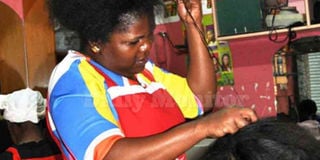Taxes weighing down our businesses - Women

A hairdresser plaits a weave in one of the saloons in Galiraaya Mall, downtown Kampala. Despite the rise in female-owned businesses, most do not live beyond the first year. PHOTO/FILE
What you need to know:
- The charges include trading licence fees, power charges, garbage collection dues and security fees.
Ms Aisha Nabukenya, a small scale business woman, spends sleepless nights worrying over numerous local market dues than growing her business to a level she would be proud of.
Top on the list of people whose path she does not want to cross are market dues enforcers and tax collectors whom she actually cannot differentiate.
As a result, over the last 15 years, Ms Nabukenya has been routinely changing her work locations, looking for some sort of “little breather from the two tax collectors.
“I have lost count of taxes and so many other charges I am required to pay time and again,” she said in an interview last week.
Ms Nabukenya, who runs a textile store, pays between Shs1 million and Shs2.5 million in taxes and related dues per year to Uganda Revenue Authority, Kampala Capital City Association (KCCA) and arcade managers.
“What should be my profit, some of which I could use expanding my stock is eroded by taxes and all sorts of charges. So how do you expect me to expand?” she said.
Some of the charges wiping out Ms Nabukenya’s base capital include presumptive taxes, trading licence fees, power charges, garbage collection dues and security fees.
Ms Nabukenya’s struggles with taxes and the numerous charges is not unique to her as it resonates with most women running micro, small and medium enterprises (MSMES).
“Women-run businesses seem to suffer the most tax burden,” said the URA assistant commissioner for research, planning and development, Ms Milly Isingoma Nalukwago.
Speaking at an e-conference on gender, business and taxation in Uganda held last week, Ms Nalukwago added that their research conducted recently found out that women suffer more from numerous fees and market charges than from the taxes being imposed by URA.
Ms Nalukwago noted most women do not have enough access to potential tax relief information due to high rate of illiteracy.
In his presentation, the UN Women Country Representative, Dr Maxime Houinato, said little is being done in terms of taking into account the particular nature of women businesses and providing tailor made solutions to them.
He noted that lengthy registration and licensing formalities also hinder most women from starting businesses. He also urged government to protect small scale businesses from imported products.
Mr Julius Mukunda, the executive director of Civil Society Budget Advocacy Group, said the multiple user fees imposed in markets and arcades where many women ply their trade is increasing the tax burden.
“What happens in many markets is that you will be charged for taking bananas to the market, then you pay some other charges at the entrance of the market and for the space where you are trading from. When inside the market, you pay some charges for cleaning, collecting the garbage, using the toilet and for providing the light. It’s just too much to bear,” Mr Mukunda said.
Trend
According to the Uganda National Household Survey for 2016/17, 86 per cent of women in business are in informal employment. Women-run businesses are bars, hotels, food vending, night clubs.





